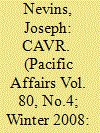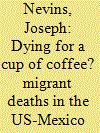|
|
|
Sort Order |
|
|
|
Items / Page
|
|
|
|
|
|
|
| Srl | Item |
| 1 |
ID:
082600


|
|
|
|
|
| Publication |
2008.
|
| Summary/Abstract |
This article provides an overview of, and analyzes, how the final report of East Timor's Commission on Reception, Truth and Reconciliation (CAVR) treated matters of responsibility for gross human rights abuses, accountability and reconciliation. While the article acknowledges the value of the report, it highlights Chega!'s limitations. The CAVR did not go as far as it could and should have in analyzing responsibility for atrocities and recommending amends. In making this argument, this article moves beyond relatively conventional analyses of reconciliation that focus on individuals and their attitudes, values and beliefs, and overlook collective and material forms of violence and injustice. Instead, it focuses on state actors, particularly those beyond Indonesia, who aided and abetted Jakarta's crimes, while advocating a wide-ranging analysis and repair of the associated damage. In doing so, the article contends that reparations for the damage must go beyond the immediate conflict so that those persons, groups or institutions whose privilege in part derived from East Timor's victimization also provide amends. It thus champions the notion that reconciliation and redistributive justice are inextricably linked
|
|
|
|
|
|
|
|
|
|
|
|
|
|
|
|
| 2 |
ID:
076929


|
|
|
|
|
| Publication |
2007.
|
| Summary/Abstract |
Well over 4,000 unauthorised migrants have lost their lives in the U.S.-Mexico border region since 1995. These deaths have occurred at the intersection of a dramatically strengthened U.S. boundary policing enforcement apparatus and persistent and arguably growing out-migratory pressures in Mexico and beyond. A number of the deceased have come from coffee-growing and -harvesting households and regions in Mexico and Central America, areas devastated by unstable commodity prices that reached their lowest point in a century in 2000-2001. This article explores the discursive and empirical interrelationship between a neoliberalised international coffee market, an increasingly policed U.S.-Mexico boundary, and migrant deaths. In doing so, it finds evidence to suggest that there is a causal link between the international crisis in prices received by coffee bean producers, out-migration by individuals in households and communities dependent on the coffee sector for their livelihoods, and migrant fatalities. It thus illustrates that the age of neoliberalism is one in which processes of nationalisation, liberalisation, and regulation exist simultaneously in space and time, the intersection of which in a world of deep inequality sometimes produces untimely death for those on the global socio-economic margins. Finally, the article highlights the limitations of extant research on this matter and lays out an agenda for future investigation
|
|
|
|
|
|
|
|
|
|
|
|
|
|
|
|
|
|
|
|
|